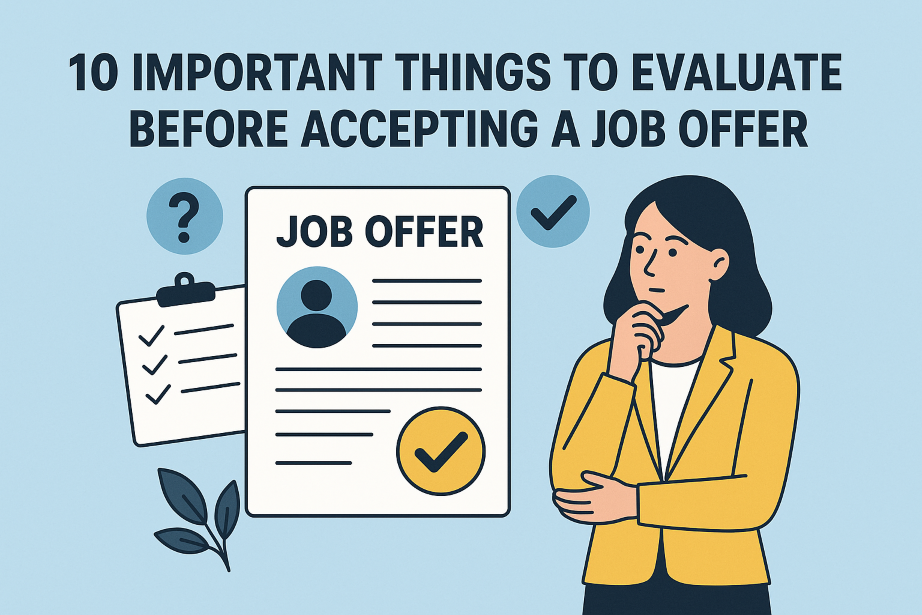Receiving a job offer is always exciting. After investing your time and energy into the interview process, getting an official offer can feel like a big win. But before you rush to say “yes,” it’s essential to take a moment to think things through.
A job offer is more than just a salary—it’s about your future, lifestyle, and peace of mind. Here are ten critical factors you should reflect on before giving your final acceptance.
1. Understand the Role Clearly
Job titles can sometimes be misleading. What sounds like a perfect position on the surface might involve responsibilities you weren’t expecting.
Carefully go through the job responsibilities and daily tasks. Make sure they align with your career interests and strengths. Don’t hesitate to ask questions if any part of the role seems vague or confusing. You should feel clear about what’s expected from you before stepping in.
2. Don’t Focus Solely on the Salary
While the paycheck is a major part of the decision, it’s not everything. Many job seekers make the mistake of choosing the offer with the highest number without looking at the entire compensation package.
Think about bonuses, performance incentives, and stock options (if available). A slightly lower salary with better benefits and growth potential might actually be a better deal in the long run.
3. Evaluate the Benefits Provided
Benefits can add significant value to your job. These may include health coverage, retirement plans, paid time off, mental health support, and even work-from-home options.
Ask for detailed information on benefits before signing anything. Having a comprehensive benefits package can make your work experience much more secure and enjoyable.
4. Think About Work-Life Balance
Ask yourself—how much of your personal time are you willing to give up for work? If the job demands late nights or weekend availability, will it interfere with your family time or personal priorities?
You don’t want to end up feeling burnt out. A balanced work life helps you stay mentally and emotionally healthy, which ultimately reflects in your performance too.
5. Get a Feel for the Work Environment
Every workplace has its own culture. Some are fast-paced and competitive, while others are collaborative and laid-back. Try to get a sense of the company’s environment through employee reviews, social media, or by asking direct questions.
Are the employees happy? Is there mutual respect within the team? A toxic culture, no matter how good the job sounds, can make work life miserable.
6. Examine Job Stability
One of the most overlooked but crucial points is job security. Especially if the company is a startup or going through financial shifts, you need to check its track record.
Has the company been laying people off recently? Is the industry facing instability? You want to avoid joining an organization that may let you go shortly after hiring.
7. Think About the Commute or Remote Setup
If the job requires you to work from an office, how far is it from your home? Is the travel time reasonable, or will it wear you out daily?
On the other hand, if it’s remote, ask if there are any fixed login hours, mandatory virtual meetings, or occasional visits to the office. A role that fits your lifestyle will be much easier to adjust to and sustain in the long run.
8. Opportunities for Growth and Learning
Every job should take you one step ahead in your professional life. Does the company provide avenues to upskill, attend training, or climb the ladder?
If you feel the position might leave you stuck or doing repetitive tasks with no learning, it might be wise to reconsider. Always look for roles that challenge you and expand your potential.
9. Trust Your Inner Voice
Sometimes, despite everything looking perfect on paper, something might feel off. Maybe the interviewer didn’t treat you respectfully, or maybe the hiring process felt rushed or unclear.
Don’t ignore these subtle red flags. Intuition is often based on past experiences and unconscious observations. If you feel uneasy, it’s okay to take a step back and think harder.
10. Consider How It Will Impact Your Resume
Finally, think about what this job adds to your career story. Will it help you move closer to your long-term goals? Will it enhance your experience and skills?
A job should ideally serve as a stepping stone to bigger opportunities. If it feels like a dead-end role, even if everything else seems fine, you might want to hold out for something that fits better into your career vision.
Conclusion
A job offer can feel like a reward for your hard work—but don’t let that excitement rush your judgment. Take time to weigh the offer from every angle. Think about your personal goals, work-life balance, growth potential, and overall happiness.
You deserve a job that supports both your ambitions and your well-being. Making a careful, thoughtful decision now can save you from stress and regret later. So, take your time, ask questions, and choose what’s best for you—not just in the present, but for your future too.



